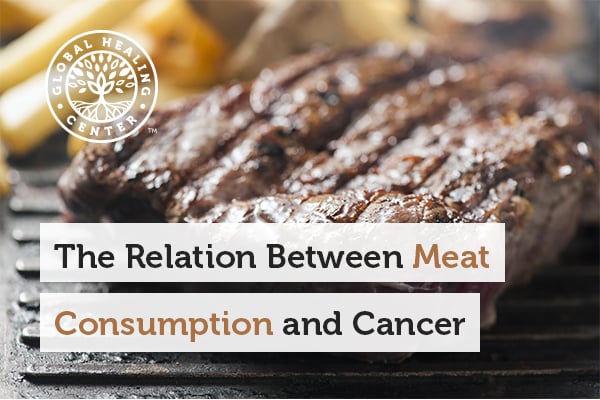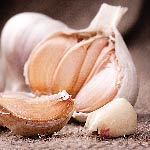
One of the central philosophies of Global Healing is an adherence to a raw, organic, vegan diet. It’s also one of the most controversial. There are many reasons to adopt a vegan diet, such as religious beliefs, a desire to not harm animals, or simply to support one's health. While we at Global Healing do love our animal friends, the reason we promote this lifestyle is because of the health benefits. One of the greatest health benefits of a vegan diet is a decreased risk of many types of cancer.
Meat Is Carcinogenic
There is a strong, well-documented, well-established relationship between the consumption of animal products and many types of cancer. An exhaustive nutritional study involving over half a million people found that those who eat large amounts of meat, particularly red and processed meat, faced a significantly higher cancer risk.[1]
According to the World Health Organization (WHO), processed meat is a carcinogen and red meat is "probably carcinogenic."[2] Before you think this is fringe science or a new theory, consider that the American Cancer Society recommends that you limit your consumption of red and processed meat and other sources of high-fat protein, including chicken.[3]
The cancer risk from a diet high in animal protein (20%+ of total calories) is now considered to be on par with smoking. Unsurprisingly, a diet high in plant protein shows no such effect. This could be because plant-sourced protein does not stimulate growth hormones, like IGF-1 (insulin-like growth factor), animal protein does. [4]
IGF-1 in Meat Assists Tumor Growth
IGF-1 is a growth factor that promotes cell division in the body, which is a great thing if you’re a growing child. In adults, however, excess IGF-1 in the body can encourage the growth of tumors. The higher the levels of this hormone, the greater the risk of developing several types of cancer. IGF-1 helps transform normal cells into cancerous cells by both inhibiting normal cell death and stimulating cell division.[4, 5] These corrupted cells then metastasize to other areas of the body.[6]
Of course, there are other factors that promote cancer in the body. Methionine, an amino acid found primarily in animal products, promotes the growth of tumors and cancer.[7] It’s not only animal protein that elevates your cancer risk, however.
Saturated Fat Increases Cancer Risk
Consuming saturated fat from animal sources contributes to common types of cancer and decreases the likelihood of surviving a cancer diagnosis.[8] Pancreatic, prostate, breast, and colorectal cancer show the strongest correlation with saturated fat consumption.[9]
- The saturated fat found in dairy and red meat increases your risk of developing pancreatic cancer.[10, 11, 12]
- A diet high in saturated fat from foods like beef and cheese is linked to aggressive prostate cancer.[13]
- Breast cancer risk and mortality increase with red meat and dairy consumption.[14] Survival rates actually dip significantly with high saturated fat intake after a breast cancer diagnosis. Alarmingly, animal product consumption during adolescence seems to predict breast cancer risk years before cancer development and diagnosis.[15, 16]
- Up to 50% of all cases of colorectal cancer can be attributed to diet and lifestyle, specifically the consumption of dietary fat, red and processed meat, and dairy.[17] In fact, higher consumption of animal products before diagnosis predicts a higher risk of dying from this type of cancer.[18]
Meat and Pediatric Cancer
What a mother eats during pregnancy can increase or decrease the risk of the child developing some types of childhood cancer. Genetic changes linked to cancer can begin in the womb.[19]
Acute lymphoblastic leukemia (ALL) is both the second most common childhood cancer and the second most common cause of mortality for children under 14. The risk of developing ALL is linked to maternal smoking habits[20] and the type of protein the mother consumed while her child was in utero. Eating plant-based protein such as beans, vegetables, and fruit during pregnancy seems to lower the risk of children developing this disease.[21,22]
Brain tumors, which account for 20% of the cases of childhood cancer, are linked to maternal diet during pregnancy.[23] In particular, the consumption of cured meat and sausage seems to significantly increase the risk of brain tumors.[24, 25] Consuming dairy or eggs while pregnant also boosts the risk of the child developing brain tumors. Conversely, a diet high in grains, fresh fish, and cruciferous and yellow-orange vegetables reduces the risk of developing brain tumors.[26]
Lifestyle Is Key to Prevention
Many complex and interconnected factors such as genetics, environment, exposure to hazardous material, and diet determine your cancer risk. Genetics play a significant role but, unfortunately, there’s not a thing any of us can do about the genes we’re born with. Nutrition, however, is something most of us can control. The best thing you can do to reduce your risk of cancer is to follow a raw, organic, vegan diet.
If you absolutely cannot go all vegan, you should, at least, reduce your consumption of meat and dairy. Baby steps are an effective way to elicit change. Start by going completely meatless one day a week. After a month of “Meatless Mondays,” add a “Fruitarian Friday” or “Salad Sunday” to the mix. Continue in this manner until you feel comfortable with a primarily plant-based diet. To help, we have many healthy and delicious vegan recipes that include everything from complete dishes to sides and even desserts.
Going vegan will not guarantee that you’ll never develop cancer but it is a strategy that can help reduce your risk.
References (26)
- Sinha, Rashmi, et al. “Meat Intake and Mortality: A Prospective Study of over Half a Million People.” Arch Intern Med, vol. 169, no. 6, 23 Mar. 2009. Accessed 28 Sept. 2016.
- WHO. “Q&A on the Carcinogenicity of the Consumption of Red Meat and Processed Meat.” World Health Organization, World Health Organization, 17 May 2016. Accessed 28 Sept. 2016.
- Brown, JK, et al. “Nutrition and Physical Activity During and After Cancer Treatment: An American Cancer Society Guide for Informed Choices.” CA: A Cancer Journal for Clinicians. 53.5 (23 Oct. 2003): 268–91. 4 Jan. 2017.
- Levine, Morgan E., et al. “Low Protein Intake Is Associated with a Major Reduction in IGF-1, Cancer, and Overall Mortality in the 65 and Younger but Not Older Population.” Cell Metabolism, vol. 19, no. 3, 1 Mar. 2014, pp. 407–417. Accessed 28 Sept. 2016.
- Kaaks, R. “Nutrition, Insulin, IGF-1 Metabolism and Cancer Risk: A Summary of Epidemiological Evidence.” Novartis Foundation Symposium., vol. 262, 26 Nov. 2004, pp. 247–60. Accessed 28 Sept. 2016
- Yu, Herbert, and Thomas Rohan. “Role of the Insulin-Like Growth Factor Family in Cancer Development and Progression.” Journal of the National Cancer Institute, vol. 92, no. 18, 20 Sept. 2000, pp. 1472–1489, 0.1093/jnci/92.18.1472. Accessed 28 Sept. 2016.
- Halpern, BC, et al. “The Effect of Replacement of Methionine by Homocystine on Survival of Malignant and Normal Adult Mammalian Cells in Culture.” Proceedings of the National Academy of Sciences of the United States of America., vol. 71, no. 4, 1 Apr. 1974, pp. 1133–6, Accessed 28 Sept. 2016.
- Pan, A, et al. “Red Meat Consumption and Mortality: Results from 2 Prospective Cohort Studies.” Archives of internal medicine. 172.7 (14 Mar. 2012): 555–63. 4 Jan. 2017.
- Vecchia, La. “Cancers Associated with High-Fat Diets.” Journal of the National Cancer Institute. Monographs., 1 Jan. 1992, pp. 79–85, Accessed 28 Sept. 2016.
- Jansen, Rick J., et al. “Fatty Acids Found in Dairy, Protein, and Unsaturated Fatty Acids Are Associated with Risk of Pancreatic Cancer in a Case-Control Study.” 134.8 (15 Apr. 2014): n.pag. 4 Jan. 2017.
- PERICLEOUS, MARINOS, et al. “Nutrition and Pancreatic Cancer.” Anticancer Research, vol. 34, no. 1, Jan. 2014, pp. 21–9, Accessed 28 Sept. 2016.
- Bosetti, Cristina, et al. “Nutrient-Based Dietary Patterns and Pancreatic Cancer Risk.” Annals of Epidemiology, vol. 23, no. 3, 1 Mar. 2013, pp. 124–128, 10.1016/j.annepidem.2012.12.005. Accessed 28 Sept. 2016.
- “Increased Saturated Fat Intake Linked to Aggressive Prostate Cancer.” Science Daily, ScienceDaily, 19 Apr. 2016. Accessed 28 Sept. 2016.
- Cho, E, et al. “Premenopausal Fat Intake and Risk of Breast Cancer.” Journal of the National Cancer Institute., vol. 95, no. 14, 17 July 2003, pp. 1079–85. Accessed 28 Sept. 2016.
- Farvid, Maryam S., et al. “Adolescent Meat Intake and Breast Cancer Risk.” International Journal of Cancer, vol. 136, no. 8, 3 Oct. 2014, pp. 1909–1920, 10.1002/ijc.29218
- “Eating a High-Fat Diet and Breast Cancer Risk | Susan G. Komen®.” Komen.Org, 2016. Accessed 28 Sept. 2016.
- Vargas, Ashley J., and Patricia A. Thompson. “Diet and Nutrient Factors in Colorectal Cancer Risk.” Nutr Clin Pract, vol. 27, no. 5, 14 Aug. 2012, pp. 613–623, 10.1177/0884533612454885. Accessed 28 Sept. 2016
- McCullough, Marjorie L, et al. “Association Between Red and Processed Meat Intake and Mortality Among Colorectal Cancer Survivors.” Journal of Clinical Oncology, 1 July 2013, pp. 1126–49, 10.1200/JCO.2013.49.1126. Accessed 28 Sept. 2016.
- “New Study Suggests Link Between Maternal Diet and Childhood Leukemia Risk.” UC Berkeley News, University of California Berkeley, 19 Aug. 2004, Accessed 28 Sept. 2016.
- Stjernfeldt, Michael, et al. “MATERNAL SMOKING DURING PREGNANCY AND RISK OF CHILDHOOD CANCER.” The Lancet, vol. 327, no. 8494, 14 June 1986, pp. 1350–1352, 10.1016/S0140-6736(86)91664-8. Accessed 28 Sept. 2016
- Booker, Susan M. “Headliners: Maternal Nutrition and Child Cancer: Mother’s Pre-Pregnancy Diet May Influence Child Cancer Risk.” Environmental Health Perspectives 112.15 (2004): A877. Print.
- Kwan, Marilyn L. et al. “Maternal Diet and Risk of Childhood Acute Lymphoblastic Leukemia.” Public Health Reports 124.4 (2009): 503–514. Print.
- Bunin, Greta R., Kuijten René R., Boesel Carl P., Buckley Jonathan D., and Meadows Anna T. "Maternal Diet and Risk of Astrocytic Glioma in Children: A Report from the Childrens Cancer Group (United States and Canada)." Cancer Causes & Control 5.2 (1994): 177-87. Web.
- Huncharek, M, and B Kupelnick. “A Meta-Analysis of Maternal Cured Meat Consumption During Pregnancy and the Risk of Childhood Brain Tumors.” Neuroepidemiology., vol. 23, 24 Jan. 2004, pp. 78–84. Accessed 28 Sept. 2016.
- Searles Nielsen, Susan et al. “Childhood Brain Tumors and Maternal Cured Meat Consumption in Pregnancy: Differential Effect by Glutathione S-Transferases.” Cancer epidemiology, biomarkers & prevention : a publication of the American Association for Cancer Research, cosponsored by the American Society of Preventive Oncology 20.11 (2011): 2413–2419. PMC. Web. 28 Sept. 2016.
- Pogoda, Janice M. et al. “An International Case-Control Study of Maternal Diet during Pregnancy and Childhood Brain Tumor Risk: A Histology-Specific Analysis by Food Group.” Annals of epidemiology 19.3 (2009): 148–160. PMC. Web. 28 Sept. 2016.
†Results may vary. Information and statements made are for education purposes and are not intended to replace the advice of your doctor. If you have a severe medical condition or health concern, see your physician.







